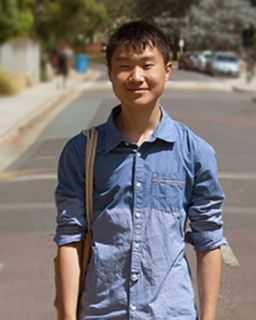Henry
I've always found academia fascinating – that opportunity to really understand the nature of things, the kinds of causal relations, and to understand it from multiple perspectives.
It can be difficult to pinpoint exactly when your love for a subject truly began. Not so for first year Bachelor of Philosophy (Arts) student Henry Wu.
Henry has the kind of intellectual curiosity that led him to read deep thinkers on language and linguistics when he was in year 9.
“I was always interested in diversity – in different cultures and different languages,” Henry says.
His interest in languages led the native Cantonese speaker to study Japanese (accelerated), Korean and Classical Greek for his New South Wales Higher School Certificate (HSC). But that would come later. In year 9, he’d already begun to look a bit deeper and fulfil his curiosity about how language works.
“I did a bit of reading on it – some of the pop linguistics books like Steven Pinker’s The Language Instinct and some work by Noam Chomsky,” he says.
That was when Henry realised how broad the field was.
“Almost everything I was interested in had some aspect of linguistics connected to it.”
Henry’s passion for linguistics led him to start what he jokingly refers to as a ‘cult’ at his alma mater Baulkham Hills High School. It was meant to be an OzClo club, but ended up incorporating both practice sessions for OzClo problems as well as other interesting theory and activities.
Theirs was the first team from his school to participate in OzClo. And for new entrants, they performed brilliantly, coming second in the state. The next year, they did even better, coming second in the country. That meant they were invited to compete at the International Linguistics Olympiad in Mysore, India, in 2016.
Henry describes the week-long experience as being one of his “favourite” things to have ever happened.
“It was refreshing and exciting to have a group of people to talk to who understood things like metathesis and schwa’s,” he enthuses.
He even celebrated his 17th birthday during the Olympiad.
“We did a team problem,” he says, laughing.
The team problem took three to four hours to solve and involved transcribing sounds.
“Even though it was stressful, it was also incredibly entertaining.”
For his efforts at the Olympiad, Henry went home with a silver medal for the individual contest.
“I was pretty happy about that,” he concedes.
Unsurprisingly, Henry intends to major in Linguistics and for now at least, has his eye on doing postgraduate studies.
“I've always found academia fascinating – that opportunity to really understand the nature of things, the kinds of causal relations, and to understand it from multiple perspectives.”
The PhB program very much appealed to Henry, because it offered him the opportunity to “unlock the door into academia”.
“I didn't really want my whole undergrad degree to be learning from a textbook or from a lecturer,” he says.
“I wanted to be actually able to do something while I was in the position of still learning about new ideas and different fields.”
He was drawn to the PhB at ANU in part because it’s home to the ARC Centre of Excellence for the Dynamics of Language. Again, it all comes back to diversity.
“The Centre focuses on all these interesting questions about the diversity of language,” he begins.
“So, why are there so many different languages, how do languages differ from each other, what does that difference tell us about the nature of language?
“Those kinds of questions are incredibly fascinating and something I'd like to work on.”
Henry is a strong advocate for studying Linguistics at the tertiary level, and sees it as fitting well with both the university experience and the ANU motto.
“Linguistics is one of the subjects which isn't taught in high school,” he says.
“And I think coming to university to do a completely different subject that you haven't done is the embodiment of what it means to be at university academically.
“It’s about trying new things, engaging in a truly broad range of subjects, a broad range of theories –and really engaging with them with a sense of curiosity.”
Henry’s Top 5 recommendations of language & linguistics books to get you started
1. The Language Instinct, Steven Pinker
A classic and accessible introduction to thinking about language as set of structures.
2. Dying Words, Nicholas Evans
An informative and perhaps surprisingly emotional book (written by an ANU professor) about why endangered languages and language death should matter to us all.
3. You Are What You Speak, Robert Lane Greene
A collection of well-told, real-life examples of how languages are used and abused in societies. Think something as common as language isn’t political? Think again.
4. Words of the World, Sarah Ogilvie
A look into the remarkably international history of the English language’s most authoritative reference, the Oxford English Dictionary.
5. In the Land of Invented Languages, Arika Okrent
If you’ve ever wondered whether people have designed artificial languages (the answer is heck yes) and for what purpose, this is for you.

Degree
Learn more about Henry's degree: